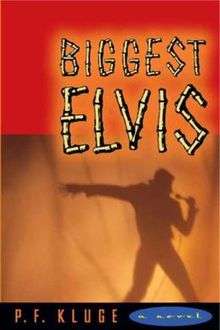Biggest Elvis: A Novel
Biggest Elvis, also known as Biggest Elvis: A Novel,[1] is the first novel[2] written by American author P. F. Kluge, an ex-U.S. Peace Corps volunteer in the Pacific region[3] and writer-in-residence at Kenyon College.[4] This 1996 literary piece started out as a journalistic writing for Playboy magazine, to illustrate the nightlife in brothels and nightclubs when fleets of American naval servicemen dock for sailor’s shore-leave[2] on the port of Olongapo City.[4] It is also a portrayal of the entrapment of poverty-stricken residents of Olongapo within a "military economy" through the nightly and ritualistic on-stage rebirths, deaths, and resurrections of Elvis Presley by three American copycats living and making a livelihood while in the Philippines.[5]
 Book cover for P. F. Kluge's novel Biggest Elvis | |
| Author | P. F. Kluge |
|---|---|
| Country | United States |
| Language | English |
| Genre | Fiction |
| Publisher | Penguin |
Publication date | 1996 |
| Pages | 341 |
| ISBN | 0-14-025811-6 |
Thematic description
In general, Kluge’s Biggest Elvis is the story of a former college professor and of America itself.[6] The "part mystery" and "part love story" novel[7] is set in Olongapo City, a Philippine town closest to Subic Naval Base, a former U.S. naval installation in the Far East during the 1990s. As a narrative and a commentary[8] regarding American "cultural imperialism"[3] – including "pop-culturalism"[5] – in the Asian region, and the final years of militaristic presence of the United States in Subic Bay, Biggest Elvis protagonizes three American Elvis Presley impersonators and caricatures[3] who performs in a nightclub known as "Graceland",[7] a building that started-out as a movie theater.[5]
Plot and character outline
The triad of reborn Elvises include the fictional persons of Ward Wiggins, Chester Lane, and Albert Lane. They were a representation of the changing roles of Americans in the world stage of the time, as "vigorous pioneers"[5] and "lean innovators" turned extravagant and colossal superpowers.[1][5] Wiggins was the eldest of the trio of impersonators and an unsuccessful English-language professor. Chester Lane, known in the narrative as Baby Elvis,[1] was the imitator of the youthful Elvis Presley. While his brother, Albert, revived the Elvis epitomized in American cinema, and called as "Dude Elvis".[1] The most senior and an obese personification[1] of Elvis, Wiggins, came to be regarded as the "biggest Elvis" – a religious symbolic figure and savior – of the local people and bargirls of Olongapo City,[1][3] Wiggins was the most serious entertainer among the three because he reaches out to the Olongapo bargirls in order to uproot and lift them up away from their current flesh-driven livelihood, while the Lane Brothers only regard their performances as a momentary engagement.[2] For Wiggins, his showbiz entanglement was a saintly and spiritual calling. He believed that he was indeed the real Elvis, not just a mimic of America’s King of rock and roll music.[5] However, their popularity as performers was overtaken in the end – prior to Wiggins final and greatest Elvis Presley entertainment act – by five bargirls, namely Whitney, Elvira, Dolly, Lucy Number Three, and Malou.[1]
References
- Biggest Elvis: A Novel by P. F. Kluge, ISBN 978-0-670-86974-9, ISBN 0-670-86974-0
- Pearl, Nancy. Book Lust: Recommended Reading for Every Mood, Moment, and Reason, books.google.com
- Biggest Elvis by P. F. Kluge
- Lobanov-Rostovsky, Sergei. Guns, Drugs, and Elvis: A Guide to Research for Fiction Writers Archived 2010-07-01 at the Wayback Machine, A novelist and creative writing teacher revises the injunction to "write what you know"], bulletin.kenyon.edu
- Ferguson, Sarah. Graceland in the Philippines, Books in Brief: Nonfiction, Books, The New York Times, nytimes.com, September 1, 1996
- Eder, Richard. Pretenders to the King's Throne, Biggest Elvis by P.F. Kluge, Fiction, Article Collections, Los Angeles Times, articles.latimes.com, August 04, 1996
- Biggest Elvis: A Novel by P. F. Kluge, flipkart.com
- Inskeep, Steve and Nancy Pearl. A Librarian Suggests Some Escapist Fare, Summertime, and the Reading is Easy, npr.org, July 23, 2004